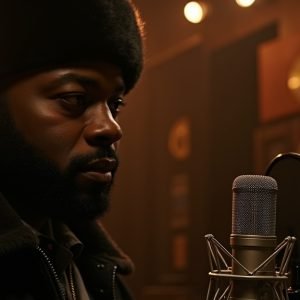The dynamic landscape of South African hip hop continues to be a fertile ground for discussions on artistic merit and evolution. In a recent appearance on DJ Speedsta’s popular “5FM Hip Hop Nights,” artist Buzzi Lee found herself at the centre of a conversation familiar to many in the genre: the challenge to freestyle. Her direct refusal to perform impromptu rhymes, coupled with a clear articulation of her creative process, has reignited debates surrounding authenticity and the diverse paths artists take within the hip hop ecosystem.
During the interview, DJ Speedsta, a prominent voice in the nation’s hip hop radio scene, posed the customary question, “Can you freestyle?” Buzzi Lee responded with a candid “No, I’m not gonna claim it because you want to put me on the spot.” This straightforward reply, rather than an outright dismissal, was followed by a thoughtful explanation of her artistic journey. She clarified that her foundation in music wasn’t built on battling or spontaneous lyrical output, but rather on a more deliberate and structured creative approach. “I went to school for behind the scenes,” Buzzi Lee explained. “So what I majored in actually was TV writing and TV sound for television. So I wasn’t shook, I kinda gravitated towards music.” This background in visual and auditory production for television has clearly shaped her perspective, fostering a preference for meticulously crafted records and narrative-driven storytelling.
This moment echoed a similar incident just weeks prior, when rapper K.Keed also declined DJ Speedsta’s freestyle challenge on the same platform. K.Keed’s refusal similarly sparked polarized reactions, prompting widespread discussion on whether an artist who doesn’t freestyle can still be considered a legitimate MC. For some purists, the ability to deliver bars off the cuff is a cornerstone of hip hop credibility, a rite of passage that demonstrates lyrical dexterity and quick-wittedness. However, Buzzi Lee’s stance highlights a growing sentiment among a new wave of artists who prioritize the album as a cohesive work of art, a curated collection of songs that tell a story or convey a message with intention and precision. This perspective suggests that artistry in hip hop is not solely defined by improvisational skill, but also by the depth, narrative, and overall quality of recorded music.
Buzzi Lee’s approach, as elaborated in the interview, is rooted in a planner’s mindset and a perfectionist’s dedication. She admitted to disliking being put on the spot, preferring to meticulously plan her creative output. This methodical approach, influenced by her background in TV production where attention to detail and scripting are paramount, translates into her music. She views her journey as one of gradual learning and patient development, not yielding to external pressure to conform to traditional expectations if it compromises her artistic integrity. “Everybody’s journey is different, you know,” she remarked, emphasizing a personal philosophy that values unique paths over conventional ones.
The broader South African hip hop community has seen various perspectives emerge from this recurring theme. While some artists and fans champion the freestyle as an essential element of the culture, others defend the right of artists to focus on different facets of musical creation. This ongoing dialogue reflects the genre’s evolution, where the lines between traditional MCing, songwriting, production, and visual artistry are increasingly blurred. Artists like Buzzi Lee are pushing the boundaries of what it means to be a hip hop artist in the contemporary era, demonstrating that a deep understanding of narrative and a commitment to polished execution can be just as impactful as spontaneous lyrical prowess.
Buzzi Lee has established herself as a notable presence in the South African female hip hop scene, recognized for her captivating “Spitori” raps and her ability to hold her own alongside established industry figures. Her background, including studies in TV writing and sound, positions her as an artist with a holistic vision for her career. She aims to create music that resonates deeply with listeners and is confident in the body of work she presents. This philosophy extends to her influences, drawing inspiration from artists like The Game and Riky Rick for their ability to blend personal growth and artistic expression, particularly themes of family and strength.
In an industry where many artists are navigating the complexities of building a career, Buzzi Lee’s clear articulation of her artistic values provides a compelling perspective. Her refusal to freestyle is not a rejection of hip hop, but rather an assertion of her unique creative identity and a commitment to her craft. It underscores a growing recognition that authenticity in music can manifest in various forms, including meticulous songwriting, compelling storytelling, and polished production. As South African hip hop continues to diversify and mature, artists like Buzzi Lee are vital in shaping its future, encouraging a broader understanding and appreciation of the many ways artistry can flourish within the genre.
























